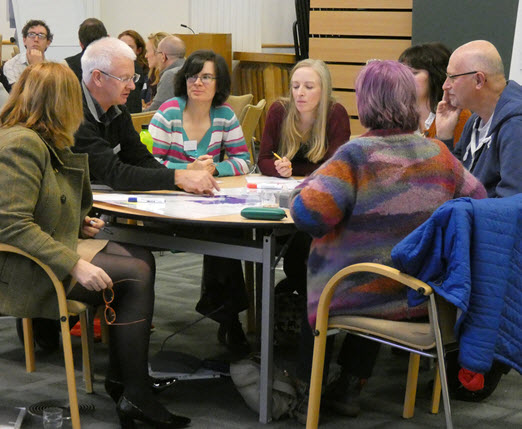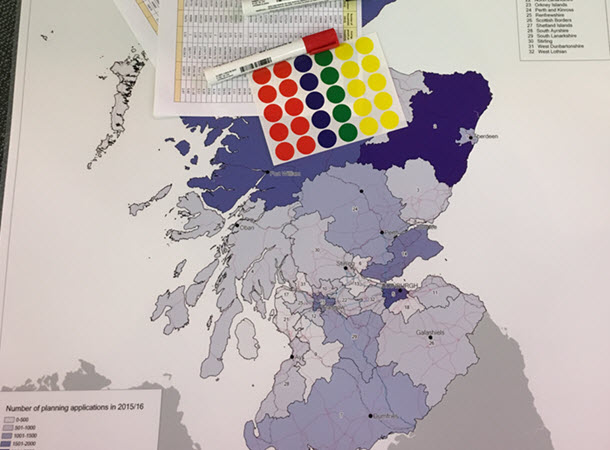The third in our series of four workshops aimed at identifying and evaluating different scenarios for the re-design of the biological recording infrastructure in Scotland was held on the 9th and 10th November, at Scottish Natural Heritage’s Battleby Conference Centre near Perth.
Following a similar format to Workshop 1 in September, which created and proposed a new Data Flow model, and Workshop 2 in October, which created an emerging service catalogue and a proposed Service Provision model, in this workshop twenty-nine attendees were invited to consider the teams, groups and organisations, i.e. the governance, that would be needed to facilitate the models proposed in the first two workshops.
The attendees discussed, developed and refined models for governance, having been presented with an ‘As-Is’ model and an ‘Aunt Sally’ model, designed as starting points for the discussion. The new Data Flow and Service Provision models from the previous workshops had also been introduced.
Attendees were divided into discussion groups that reflected individual roles and approaches, ie there were groups for ‘National Experts’; ‘Local Knowledge’; ‘Bright Sparks’ and ‘Wise Owls’. In these groups attendees were invited to discuss in turn: the type of organisation(s) needed; the level of their independence; the location of regional hub boundaries and centres; how many teams would be required at regional, national and central hubs; how would they be managed and what resources would be required.
Following a brainstorming session on culture and values for the new infrastructure, and a re-organisation of the groups, attendees went on to consider the business changes that would be required; what success would look and feel like; what the pace of change should be and what support will be needed to make the transition.
Some important messages from this workshop were:
- We collectively believe in, and want to realise as soon as possible, our vision of an improved infrastructure by 2025, and believe that a new organisation is needed to supersede current governance arrangements at all levels (central, national, regional).
- We want to have a Scottish Biodiversity Innovation Centre in Stirling, acting as our National Hub, and four Regional Hubs in Scotland.
- We recognise the value of Super Partners such as the Non Native Species Secretariat, State of Nature Partnership, all National Recording Schemes and Museums and Botanic Garden Collection Curators.
- We recognise we need to understand if and how data analytics are common across the UK or bespoke to a country and we will investigate further before determining how analytics could be fulfilled.
- We recognise that some workshop attendees prefer an evolutionary approach but feel a revolutionary approach is significantly more likely to deliver the improvements we seek.
The proposed Governance model, transcript of the workshop discussions and full set of key messages, are included in the workshop outputs document. This model, together with the proposed Service Provision model (developed during Workshop 2) and the proposed Data Flow model (developed during Workshop 1), will be taken forward to the final workshop which will consider options for funding.
The outputs from workshops 1-3 can be downloaded from the SBIF Review pages of the NBN website by following the links.
Thanks to everyone who attended and participated in the workshop. Thanks also to Liz Edwards, and Ellen Wilson for planning, creating and facilitating the workshop, and to Rachel Stroud for her input to the planning stage. Thanks also to SNH for hosting the event and funding the catering.
The final workshop (which will focus on funding options) is being held on the 4th and 5th December 2017.
For further information please contact Christine Johnston, NBN Scottish Liaison Officer.


